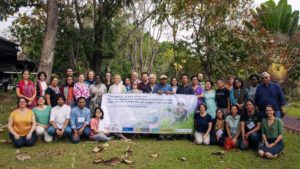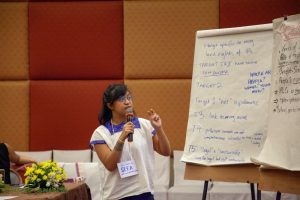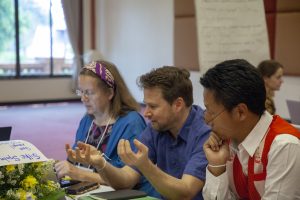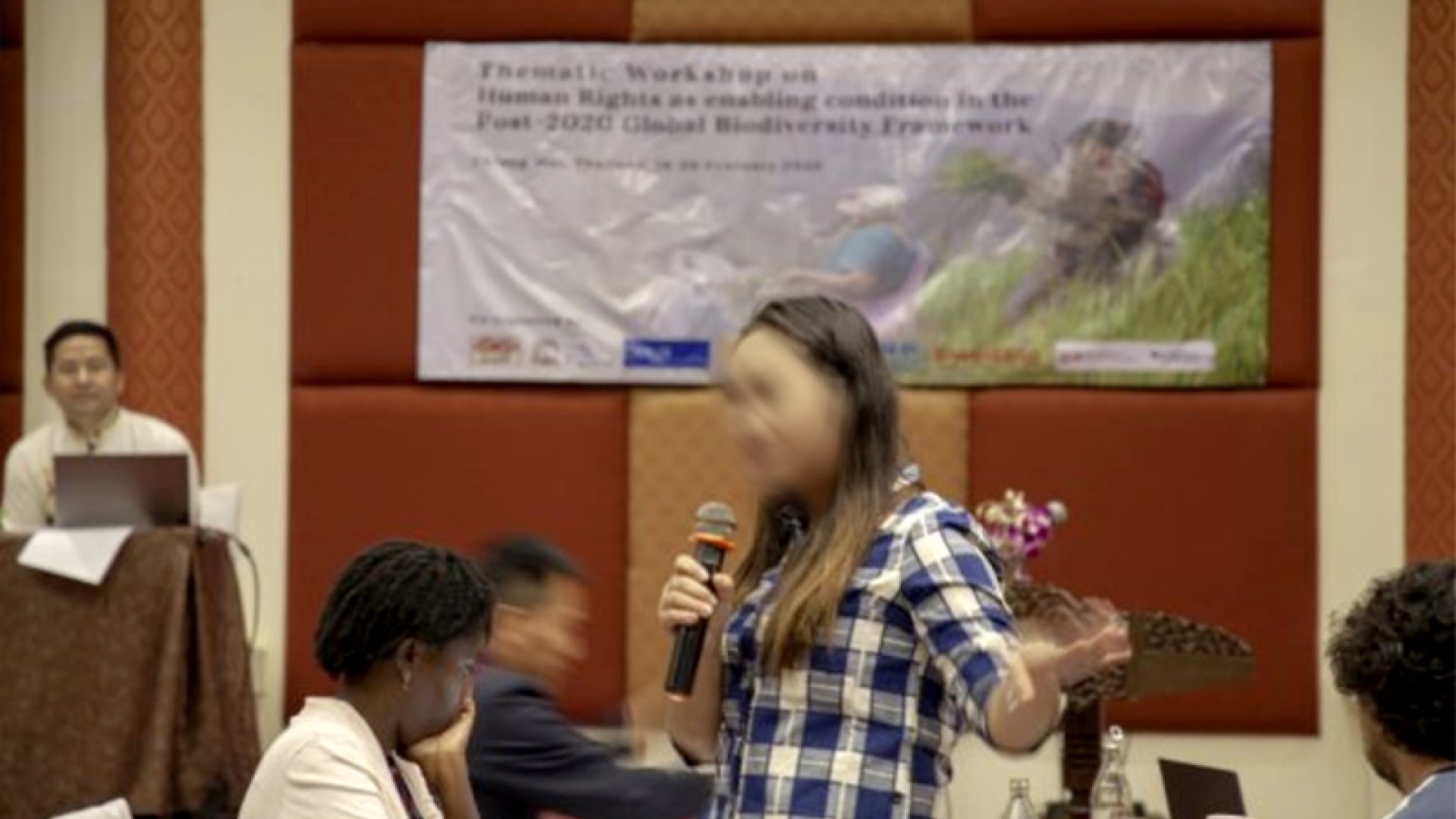First published on 02/21/2020, and last updated on 09/25/2023
By Holly Jonas (ICCA Consortium Global Coordinator) with Tom Dixon (Forest Peoples Programme, ICCA Consortium Member).
Activists and community leaders are being targeted, harassed and even killed for defending nature and their communities’ territories against industrial threats such as mining, monoculture plantations and mega-infrastructure. Well-known international NGOs are under fire for alleged human rights violations in the name of conservation. On the other hand, major reports show that supporting Indigenous peoples and communities to secure rights, governance and stewardship of their collective lands and territories is one of the most effective means of ensuring nature conservation. Public and political awareness about the interlinkages between human rights and the global biodiversity crisis are rising.
As part of a growing chorus of voices urging government Parties to the UN Convention on Biological Diversity (CBD) to ramp up efforts to stem the tide of the sixth mass extinction, Indigenous peoples, civil society organisations, researchers and UN agencies alike have sent a clear message that to address the planetary crises, they must focus on protecting human rights.

Participants and co-convenors of the thematic workshop on human rights in the post-2020 global biodiversity framework. © AIPP/Hpuji Nawng
“The scientific consensus is clear: direct and indirect drivers of change in nature have accelerated in the last 50 years and we will only achieve goals for 2030 and beyond through transformative changes in economic, social, political and technological systems. This draft fails to deliver transformative change,” said the report of an international workshop on human rights in the post-2020 global biodiversity framework, held from 18-20 February 2020 in Chiang Mai, Thailand. Several ICCA Consortium Members, Honorary members and partners were involved in this workshop as co-organisers and participants.
The 196 Parties to the UN CBD are currently negotiating this framework and expected to adopt it in October 2020, although the COVID-19 pandemic will likely change this timeline by several months. The ‘zero draft’ of the framework was scrutinised at the second round of working group negotiations in Rome, Italy, from 24-29 February 2020, where civil society and human rights advocates expressed concern that the lack of ambition and meaningful commitments will fail to usher in an era of transformative change.
The workshop in Chiang Mai underscored that human rights are an essential condition for a successful post-2020 global biodiversity framework. It identified insufficient recognition of human rights as a major gap in the zero draft. “For all people to enjoy a safe, clean healthy and sustainable environment, we have to respect, protect and fulfill human rights. To realise our human rights, we must heal, protect and sustainably live on our planet.”

Josefa Cariño Tauli (ICCA Consortium Honorary member) at the thematic workshop on human rights in the post-2020 framework. © AIPP/Hpuji Nawng.
The workshop also found that the zero draft does not sufficiently recognise the rights and roles of Indigenous peoples and communities. “Indigenous peoples are crucial partners in achieving the 2050 vision of living in harmony with nature,” said Lakpa Nuri Sherpa, Environment Programme Coordinator of Asia Indigenous Peoples Pact. “This vision cannot succeed without our full and effective participation and recognition of our customary land rights and governance systems.” The workshop called for a new target specifically on securing Indigenous peoples’ and communities’ rights to their collective territories, lands and waters, in accordance with their customary laws, governance systems and management practices.
Other key messages, gaps and opportunities to strengthen human rights in the zero draft included the following:
- In order to bend the curve of biodiversity loss, we need to bend the curve of inequality. The post-2020 framework must better integrate governance, human rights and equitable sharing of benefits and costs.
- The zero draft framework takes an overly utilitarian approach, viewing nature in terms of “services” and “benefits”. It should instead be guided by the diverse worldviews, values, ethics and spiritual beliefs that embody our reciprocal relationships with the rest of the planet and should include a goal that addresses the mutual and interdependent wellbeing of nature and people.
- The zero draft framework does not sufficiently address the direct and indirect drivers of biodiversity loss. It should include a target on halting unsustainable industries and inequitable models of economic growth that harm both biodiversity and human rights.
- The post-2020 framework should include a new target on providing a safe and enabling environment in which environmental defenders, with particular attention to Indigenous peoples, local communities and women, can operate free from threats, harassment, intimidation and violence.
- Target 2 in the zero draft, focusing on area-based conservation, includes a concerning sub-target on “strict protection”. This should be deleted to avoid continued and repeated human rights violations in the name of conservation. In addition, this target should include a clear reference to equitable governance of protected areas and other effective conservation measures and recognition of self-declared territories and areas conserved by Indigenous peoples and local communities.

Cristina Eghenter (Working Group on ICCAs Indonesia, ICCA Consortium Member and Honorary member), Terence Hay-Edie (GEF Small Grants Programme, ICCA Consortium partner and Honorary member) and Gam Shimray (Secretary General, Asia Indigenous Peoples Pact) at the thematic workshop on human rights in the post-2020 framework. © AIPP/Hpuji Nawng.
Legal experts argue that “the time has come” to integrate and recognise human rights in multilateral environmental agreements such as the CBD – not only as a matter of justice but also as a matter of efficacy. Most countries recognise the right to a healthy environment in their constitutions, and governments, judges and activists alike are bringing human rights to bear on environmental issues. As the first UN Special Rapporteur on the right to a safe, clean, healthy and sustainable environment, Professor John Knox, noted in his final report in 2018, “The interdependence of human rights and the environment is an idea whose time is here.”
For more information, please see the report of the thematic workshop on human rights in the post-2020 framework. If you have any questions, contact Holly Jonas (holly [at] iccaconsortium.org).
The “Thematic Workshop on Human Rights as Enabling Condition in the Post-2020 Global Biodiversity Framework” was held from 18-20 February 2020 in Chiang Mai, Thailand. It was organised and co-convened by Asia Indigenous Peoples Pact, Forest Peoples Programme (ICCA Consortium Member), GIZ on behalf of the German Federal Ministry for Economic Cooperation and Development, International Development and Law Organization, Natural Justice (ICCA Consortium Member), UN Environment and SwedBio at Stockholm Resilience Centre (ICCA Consortium partner). Among the 42 participants were several others from the ICCA Consortium membership and Secretariat. The key messages from the workshop were brought forward to the 2nd meeting of the CBD Open Ended Working Group on the post-2020 framework through detailed text-based recommendations and statements.
